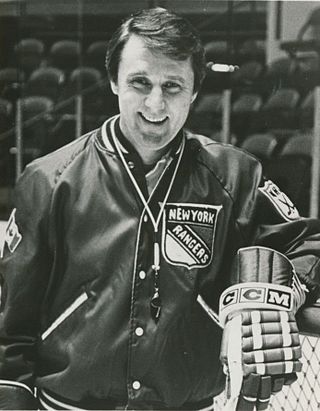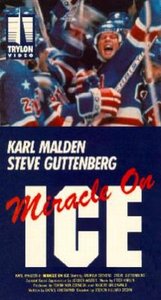
The Ice Hockey World Championships are an annual international men's ice hockey tournament organized by the International Ice Hockey Federation (IIHF). First officially held at the 1920 Summer Olympics. The IIHF was created in 1908 while the European Championships, the precursor to the World Championships, were first held in 1910. The tournament held at the 1920 Summer Olympics is recognized as the first Ice Hockey World Championship. From 1920 to 1968, the Olympic hockey tournament was also considered the World Championship for that year.

Herbert Paul Brooks was an American ice hockey player and coach. His most notable achievement came in 1980 as head coach of the gold medal-winning U.S. Olympic team at Lake Placid. At the Games, Brooks' American team upset the heavily favored Soviet team in a match that came to be known as the "Miracle on Ice."

The "Miracle on Ice" was an ice hockey game during the 1980 Winter Olympics in Lake Placid, New York. It was played between the hosting United States and the Soviet Union on February 22, 1980, during the medal round of the men's hockey tournament. Though the Soviet Union was a four-time defending gold medalist and heavily favored, the United States upset them and won 4–3.

Michael Anthony Eruzione is an American former ice hockey player. He is best known as the captain of the 1980 Winter Olympics United States national team that defeated the Soviet Union in the famous "Miracle on Ice" game, in which he scored the game-winning goal. He is the author, with Neal E. Boudette, of the national bestseller, The Making of a Miracle: The Untold Story of the Captain of The Gold Medal-Winning 1980 U.S. Olympic Hockey Team, published by HarperCollins.
Sportin Latvia includes basketball, football, ice hockey, athletics (track), rugby, tennis, cycling, and others. Ice hockey is the most popular of the Latvian sports and is closely followed by basketball. Some of Latvia's most notable athletes include hockey player Sandis Ozoliņš, football player Māris Verpakovskis, Olympic javelin thrower Jānis Lūsis, two-time Olympic BMX champion Maris Strombergs, and basketball player Kristaps Porziņģis. The national sport of Latvia is ice hockey.

The United States men's national ice hockey team is based in Colorado Springs, Colorado, with its U18 and U17 development program in Plymouth, Michigan. The team is controlled by USA Hockey, the governing body for organized ice hockey in the United States. The U.S. team is currently ranked 4th in the IIHF World Rankings.

The men's ice hockey tournament at the 1988 Winter Olympics in Calgary, Alberta, Canada, was the 16th Olympic Championship. The Soviet Union won its seventh gold medal. The silver medal was won by Finland, marking its first ever Olympic ice hockey medal. Sweden won the bronze medal. Games were held in the Olympic Saddledome, the Stampede Corral, and Father David Bauer Olympic Arena. This is so far the only Olympic tournament held on North American soil that was not won by either Canada or United States.

Mark Einar Johnson is an American ice hockey coach for the University of Wisconsin–Madison women's ice hockey team. He is a former National Hockey League (NHL) player who appeared in 669 NHL regular season games between 1980 and 1990. He also played for the gold medal-winning 1980 U.S. Olympic team.

The men's ice hockey tournament at the 1980 Winter Olympics in Lake Placid, United States, was the 14th Olympic Championship. Twelve teams competed in the tournament, which was held from February 12 to 24, 1980. The United States won its second gold medal, including a win over the heavily favored Soviet Union that became known as the "Miracle on Ice".Games were held at the Olympic Fieldhouse (8,000) and the Olympic Arena (2,500).
The men's ice hockey tournament at the 1960 Winter Olympics in Squaw Valley, United States, was the ninth Olympic Championship, also serving as the 27th World Championships and the 38th European Championships. The United States won its first Olympic gold medal and second World Championship. Canada, represented for the second time by the Kitchener-Waterloo Dutchmen, won the silver and Canada's ninth consecutive Olympic ice hockey medal. The Soviet Union won the bronze medal and its sixth European Championship. The tournament was held at the Blyth Arena, under the supervision of George Dudley on behalf of the International Ice Hockey Federation.

The Soviet national ice hockey team was the national men's ice hockey team of the Soviet Union. From 1954, the team won at least one medal each year at either the Ice Hockey World Championships or the Olympic hockey tournament.

The men's ice hockey tournament at the 1972 Winter Olympics in Sapporo, Japan, was the 12th Olympic Championship. Games were held at the Makomanai Ice Arena and at the Tsukisamu Indoor Skating Rink. The Soviet Union won its fourth gold medal. The United States won the silver, while Czechoslovakia won the bronze. Canada did not send a team to the event for the first time since ice hockey was first competed at the Olympics in 1920, instead competing with and defeating the Soviets in a competition later that year known as the Summit Series. Canada would not send a men's hockey team to the Olympics until 1980.

Ice hockey tournaments have been staged at the Olympic Games since 1920. The men's tournament was introduced at the 1920 Summer Olympics and was transferred permanently to the Winter Olympic Games program in 1924, in France. The women's tournament was first held at the 1998 Winter Olympics.

The United States of America has sent many athletes to the celebrations of the Olympic Games, starting with the first modern Olympics held in 1896. Athletes representing the United States have participated in every Olympic Games with the exception of the 1980 Summer Olympics, during which it led a boycott in protest of the Soviet Union's invasion of Afghanistan. The United States Olympic & Paralympic Committee (USOPC) is the National Olympic Committee for the United States.

The United States of America has sent athletes to every celebration of the modern Summer Olympic Games with the exception of the 1980 Summer Olympics, during which it led a boycott against the host Soviet Union due to the Soviet–Afghan War. The United States Olympic & Paralympic Committee (USOPC) is the National Olympic Committee for the United States.

Miracle on Ice is a 1981 American sports docudrama about the United States men's national ice hockey team, led by head coach Herb Brooks, that won the gold medal in the 1980 Winter Olympics. The USA team's victory over the heavily favored Soviet team in the medal round was dubbed the "Miracle on Ice". The film premiered on March 1, 1981, as an installment of The ABC Sunday Night Movie.

Because of their proximity and similar sporting cultures, Canada and United States are frequent rivals in a wide variety of international sports.

The men's tournament marked the second Olympic Games where the National Hockey League took a break to allow all its players the opportunity to play.

Ice hockey, referred to in the US simply as "hockey", is a popular sport in the United States. Hockey in the US began in 1894 when the first artificial ice rink was built in Baltimore, Maryland. Now hockey is most popular in regions of the US with cold winter climates, such as the northeast and the upper Midwest. However, since the 1990s, ice hockey has become increasingly popular in the Sun Belt due in large part to the expansion of the National Hockey League to the southeast and southwest US, coupled with the mass relocation of many residents from northern cities with strong hockey support to these Sun Belt locations.
















